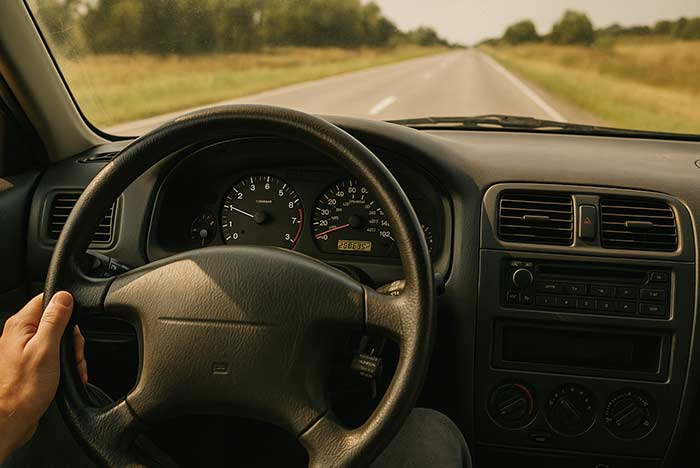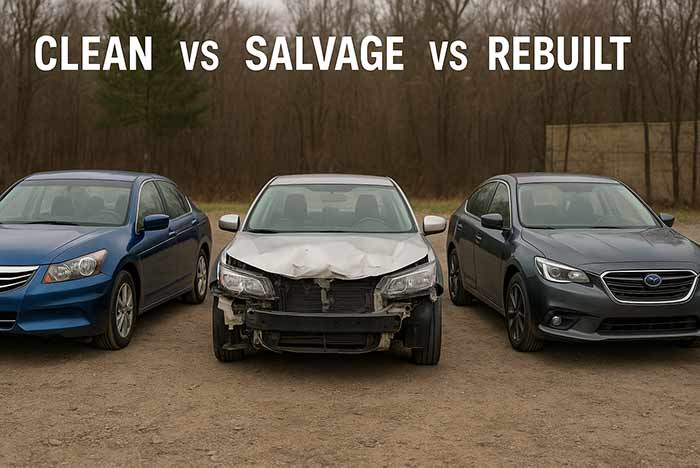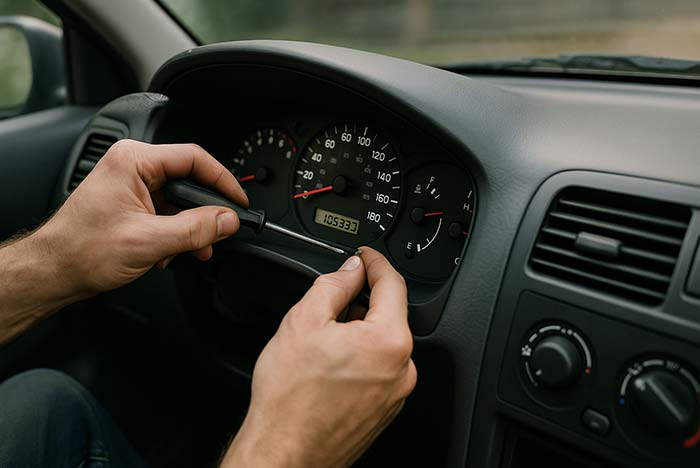
High Mileage Cars – What’s Considered Too Much & Should You Buy One?
Nowadays most of the vehicles last longer than ever. On the market there are vehicles that are pushing over 200,000 miles especially from brands that are considered reliable. Still there is a question that concerns people who are looking for a second hand vehicle: what is considered high mileage for a used car, or how many miles is too much?
Millage matters, but it is only part of the picture. The key point here is how the previous owner har maintain the vehicle. How often the engine is serviced, oil change and all filters. Because a well maintained engine with 130k miles might be way better than a neglected 70k engine. In this guide, we'll explain how mileage affects a car’s value, what mileage range is ideal, and whether buying a high mileage vehicle is a smart move.
We’ll also touch on newer concerns—like is it okay to put a lot of miles on a new car, and whether high mileage cars are worth less just because of the number on the odometer.
What Is Considered High Mileage for a Used Car?
There is no magic number, but commonly it is understood that if a car crosses 100,000 miles then the big service costs are appearing. That is the main concern usually with second hand car market buyers.
On average, cars rack up about 12,000 to 15,000 miles per year. So a five-year-old car with 75,000 miles is right on track. If it has over 100,000, that’s on the higher side—but not necessarily bad.
It Depends on the Vehicle Type
- Gasoline cars typically last around 200,000 miles with good care.
- Diesels often reach 250,000 miles or more, thanks to stronger engine components.
- Hybrids tend to hold up well but may need battery replacements past 150,000 miles.
- EVs are newer to the game, but many show minimal drivetrain wear, even past 100K.
It Also Depends on the Brand
Some brands are built to last. A Toyota Corolla or Honda Accord with 120K miles might be in better shape than a Fiat or Jeep with half that.
Cars known for lasting well beyond 100K:
- Toyota Camry
- Honda CR-V
- Lexus RX
- Ford F-150 (with proper upkeep)
High Mileage Isn’t Always a Red Flag
Mileage is just a number. What matters more is how the car was treated. A car with 90,000 hard city miles and poor maintenance is riskier than one with 130,000 highway miles and a full service history.
Ask for:
- Oil change records
- Timing belt/water pump replacement
- Transmission fluid service
- Any major repairs or recalls
Bottom line: High mileage starts around 100,000—but context is everything. The number alone doesn't tell the full story.
How Many Miles on a Used Car Is Too Much?
There’s no fixed number that makes a used car “too risky.” It depends on the car’s condition, maintenance history, and how those miles were driven.
Still, here’s a general rule:
- Under 100,000 miles = normal wear
- 100,000 to 150,000 miles = higher risk, but still viable if well maintained
- 150,000+ miles = enter with caution, but not a deal-breaker
City Miles vs. Highway Miles
Not all miles are equal.
🛣️ Highway miles are easier on the engine and brakes. Long, steady speeds mean less stress.
🏙️ City miles mean stop-and-go traffic, short trips, and more wear on components like brakes, suspension, and transmission.
A car with 130,000 highway miles may be in better shape than one with 90,000 city miles.
What to Watch Out For in High Mileage Cars
Once a car passes the 120K mark, you need to check if key parts have already been replaced. If not, they may be due soon—and those repairs aren’t cheap.
Look out for:
- Timing belt or chain – due between 90K–120K miles (if not already done)
- Transmission wear – shifts should be smooth
- Oil leaks – especially from valve cover gaskets
- Suspension noise – worn shocks, bushings, or control arms
Condition Beats Odometer
Ask yourself this: Would you rather drive a well-maintained 150K-mile car or a 70K-mile car that’s been neglected?
Get a mechanic to do a pre-purchase inspection. It’s the best way to know if a high-mile car is still healthy.
Summary: There’s no hard limit for miles, but once a car crosses 150,000, you should only consider it if it’s been properly maintained and priced right.
How Much Mileage Is Good for a Used Car?
Most buyers want a car that feels new but doesn’t cost like it. That’s where mileage matters.The sweet spot for a used car is usually 30,000 to 70,000 miles. At this range, the car:
- Has already taken the biggest hit in depreciation
- Still has plenty of life left
- Often includes service records or factory warranty
Why Lower Isn’t Always Better
A 10-year-old car with only 20,000 miles? That might sound perfect—but it could be a red flag.
Very low mileage on an older car can mean:
- Long periods of sitting (which hurts batteries, tires, seals)
- Short trips only (bad for the engine and exhaust system)
- Delayed or skipped maintenance
Cars are made to be driven. Regular use keeps them healthy.
What Mileage Makes Sense for Your Budget?
Here’s a basic breakdown:
- Under 40,000 miles: Costs more, but close to new. Good for long-term use.
- 40,000–70,000 miles: Best value. Still reliable with proper upkeep.
- 70,000–100,000 miles: Lower upfront cost. Make sure big services are done.
- 100,000+ miles: Only buy if it has clean history, great service records, and checks out mechanically.
Maintenance Trumps Mileage
Don’t just focus on the number. Ask for:
🧾 Oil and fluid change records
⛓️ Timing belt or chain history
🛞 Brake and tire condition
💥 Major repairs or accident history
A clean, 80,000-mile car with full documentation can be a smarter buy than a mystery car with 50,000.
Bottom line: 30K to 70K miles is ideal for most buyers, but good maintenance can make higher mileage cars just as appealing.
Are High Mileage Cars Worth Less?
Yes—mileage directly affects a car’s value. The more miles, the less it’s typically worth. But that doesn’t always mean it’s a bad buy.
How Mileage Affects Depreciation
Cars lose value over time. But they drop fastest in the first few years—especially when they hit major mileage milestones:
- 30,000 miles – end of many bumper-to-bumper warranties
- 60,000 miles – major service intervals begin
- 100,000 miles – psychological barrier for many buyers
- 150,000+ miles – resale demand drops sharply
A car with 100,000 miles will usually cost 30–50% less than the same model with 50,000 miles.
Condition Can Offset High Mileage
A clean, high-mileage car with a full service history can be worth more than a low-mileage car in poor shape. Buyers (and smart sellers) know this.
Brand and Model Matter
Some cars hold their value better—even with more miles. Others lose value fast, regardless of mileage.
High-mileage champs:
- Toyota Corolla & Camry
- Honda Accord & Civic
- Lexus RX
- Subaru Outback
- Ford F-150 (with regular service)
Depreciation-prone models:
- Luxury German brands (BMW, Audi, Mercedes)
- Fiat, Alfa Romeo
- Land Rover
Repairs and parts cost more on these cars, which hurts resale.
Bottom line: High mileage lowers value—but a reliable model with proof of good care can still be a solid investment.
Is Buying a High Mileage Car OK?
Yes, buying a high mileage car can be a smart move if you know what you’re getting into. It all comes down to how the car was driven, maintained, and priced.
Pros of Buying a High Mileage Car
- Lower price – You’ll pay far less up front compared to low-mileage options.
- Slower depreciation – Most of the car’s value is already lost. You won’t lose much more.
- Better options for your budget – You can often afford a better model or trim with more features.
For example, a high-mileage Lexus might cost the same as a lower-mileage Kia—but offer more comfort, safety, and long-term reliability.
Cons of Buying a High Mileage Car
- More wear and tear – Engine, suspension, and electronics may be aging.
- Upcoming repairs – Parts like the water pump, shocks, or alternator may be due for replacement.
- Limited resale value – You likely won’t get much back if you sell later.
What to Look for Before Buying
You shouldn’t skip due diligence just because the car’s cheap. Instead, be even more careful.
✅ Check service records
✅ Ask about highway vs. city miles
✅ Look for signs of rust or oil leaks
✅ Get a pre-purchase inspection from a trusted mechanic
✅ See if major components like the timing belt, clutch (if manual), or transmission have been replaced
Good Candidates for High Mileage Cars
- Reliable makes like Toyota, Honda, Subaru, and Ford (for trucks)
- One-owner vehicles with clean Carfax reports
- Highway-driven vehicles used for commuting or business
- Fleet or company cars with full service records
When to Walk Away
Avoid high-mileage cars if:
- There's no history of oil changes or major services
- The engine runs rough or the transmission shifts hard
- You notice rust, warning lights, or leaks
- It feels like a gamble—and you're not ready to take it
Bottom line: Buying a high mileage car is OK if it’s been cared for, inspected, and priced right. It’s a budget-friendly option that can go the distance—if you pick wisely.
Is It Okay to Put a Lot of Miles on a New Car?
Yes, it’s okay to put a lot of miles on a new car—as long as you maintain it properly. Cars are built to handle daily use. But racking up miles fast can have a few trade-offs.
What Happens When You Add Miles Quickly?
- You shorten the warranty period based on mileage, not time
- Resale value drops faster if you go past major thresholds early
- Maintenance costs can add up sooner, like new tires, brakes, or services due at 60K+
For example, if you drive 25,000 miles per year, you’ll hit 100,000 miles in just 4 years. That’s the point where most buyers start to lose interest—no matter how new the car looks.
Is That a Problem?
Not if you plan to keep the car long-term. High mileage doesn’t hurt you if:
- You’re not planning to resell soon
- You follow the maintenance schedule
- You use quality fluids and parts
- You address small issues before they become big problems
Some owners drive 200,000+ miles without major issues—especially with reliable brands like Toyota, Honda, and Subaru.
Consider Your Ownership Strategy
- Lease? Not ideal. Most leases cap at 10,000–15,000 miles/year. You’ll pay overage fees.
- Own and keep it? Go ahead. Drive it as much as you want.
- Plan to sell in a few years? Think twice. High early mileage can make resale tough.
Tips for High-Mileage Driving
- Stick to factory service intervals (or sooner)
- Rotate tires and align the wheels often
- Don’t skip transmission fluid changes
- Avoid hard starts and stops—especially when the engine is cold
Bottom line: Putting a lot of miles on a new car is fine—as long as you’re keeping up with maintenance and not counting on a high resale value later.
FAQ – High Mileage Cars
What is considered high mileage for a used car?
A used car is typically considered high mileage once it passes 100,000 miles. But that number means less than it used to. Many modern cars can go well past 200,000 miles with proper maintenance. Always check how the car was used and cared for—not just the odometer.
Should I avoid cars with 150k+ miles?
Not always. If the car has a solid service history, mostly highway miles, and passes a mechanical inspection, it can still be a good deal. Just be ready for wear-related repairs like suspension parts, water pumps, or gaskets.
Are highway miles better than city miles?
Yes. Highway miles are generally easier on a car. The engine runs at steady speeds, brakes are used less, and the transmission isn’t constantly shifting. City miles mean stop-and-go traffic, short trips, and more strain on components.
Do high mileage cars break down more?
They can—but it depends on the brand, how it was driven, and how well it was maintained. A reliable car with regular service may outlast a low-mileage car that was neglected.
Is 200,000 miles too much for a car?
It depends on the car. Some models—especially from Toyota, Honda, Subaru, and Ford—are known to last beyond 200K. But at that point, you’ll need proof of ongoing maintenance and a full mechanical check before buying.
Is it okay to buy a used car with 100k miles?
Yes—100,000 miles isn’t a dealbreaker anymore. Many cars today are built to last far longer. Just make sure key services have been done (like timing belt, fluids, brakes) and that it drives well.
How can I tell if a high mileage car is worth it?
Check the records. If the car was regularly serviced, has no major accident history, and runs smoothly, it may be worth the price. Always get a pre-purchase inspection to avoid surprises.

